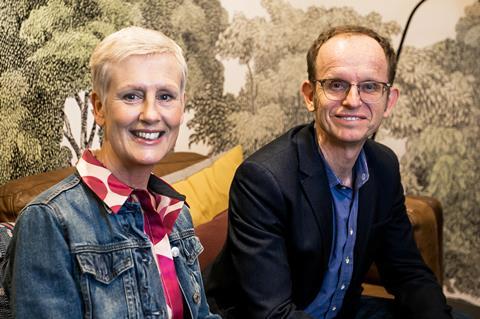
UK sellers are heading out to the American Film Market (AFM, October 31-November 5) in a climate of uncertainty as, at time of writing, the Hollywood actors’ strike remains ongoing.
However, crucially, they are heading out, and are eager to focus on business at hand and check in with their California-based contacts.
“We’re all turning up. By and large, it will be business as usual in a slightly odd world,” says Alison Thompson, co-president of Cornerstone Films.
Not only has the strike halted a lot of US production, many UK actors who are SAG-AFTRA members, or who want to be SAG-AFTRA members, have felt nervous about the optics of taking on roles in productions that could run legitimately under the SAG-AFTRA strike rules, while their peers are boycotting work. This has caused problems for many UK sales agents trying to gear up productions, with actors wanting conditions such as waivers or certainty that no AMPTP financing will be brought onto the project at the earliest stages of packaging.
And the idea that smaller scale UK independent productions could be paid greater attention by buyers looking to fill gaps left by the dearth of US production has also not quite been realised.
“The Toronto experience showed that the market has veered very strongly towards obviously commercial fare,” says Bankside’s managing director Stephen Kelliher, who is at the market with Bryn Chainey’s horror Rabbit Trap, starring Dev Patel and Rosy McEwen, which was shot in Wales under Equity contracts. “If you look at the films that were sold out of Toronto, they are almost exclusively cast-driven, they are all in the genre framework. It’s still very challenging for drama. What happened at Toronto and what sold there is informing the projects we are taking to AFM.”
Titles to land major deals at Toronto included Anna Kendrick’s directorial debut Woman Of The Hour, a true-life crime drama that also stars Kendrick and sold to Netflix for its remaining international rights for a deal understood to be worth $11m; and Richard Linklater’s crime comedy Hit Man starring Glen Powell, which also sold to Netflix for a hefty $20m.

But nothing is set in stone. “Having been in the business for as long we have been, we’re very conscious that there will be a reaction again,” agrees Mark Gooder, Thompson’s LA-based co-president of Cornerstone Films. “There will be too much of this, not enough of that; there will be one drama that’s quirky and distinctive and suddenly everyone will be looking for that.
”Anything in the genre space that’s distinctive, that feels like it’s offering something fresh to the space, will do well, because there’s a bottom-line value for it. I also think that anything that’s uplifting and funny will probably do well, if it’s a high concept, and that goes with the mood of the times. We’re feeling a lot of fear, and we also want to have a laugh – the combination of those two things is where the market is at.”
“In the market, drama is a dirty word, but the foundation of any good movie is good drama. It’s the essential ingredient,” notes Mister Smith Entertainment’s CEO David Garrett, who is bringing completed romantic comedy Young Werther starring Douglas Booth to the market. “We try to find good stories, and still exercise taste and judgement. That’s one of the great things about companies like A24 – they take risks.”
A couple of months ago, the strike uncertainty had some UK sales agents questioning whether forking out the big bucks to head to Santa Monica would be worth it. But, in the end, all major sellers will have a presence, with boutique outfits Film Seekers, Blue Finch, Kaleidoscope, SC Films and Screenbound teaming up for a shared space, as per last year.
“I feel more positive than I did a few weeks ago,” says Kelliher. “Given the fact the WGA [Writers’ Guild of America] strike has been resolved, and everyone feels there is an end-point in sight [for SAG-AFTRA strikes], whether that’s the end of this year or the beginning of next year. That’s positive.”

”The worry is that talent schedules next year on projects are going to start becoming very impacted and complicated. It is going to be a disruptive time after the strike, just like after Covid,” notes HanWay Films CEO Gabrielle Stewart, who is launching at the market thriller Walk With Me and comedy adventure Cowgirl’s Last Ride, starring Geena Davis, both which are hoping to go into production in the first half of 2024.
Garrett agrees, anticipating that even after the strikes, the impact will have a “long-tail of a year and a half, two years, until things have properly unravelled”.
“With so much uncertainty, I suspect there will be fewer new packages being launched in the marketplace compared to Cannes when buyers were faced with a plethora of projects leading to a paralysis of sorts,” observes Olivier Brunskill, international sales manager at Altitude, selling Destry Spielberg’s directorial debut Please Don’t Feed The Children, which begins shooting in New Mexico this week with a waiver. “In theory, this disruption should lead to the currency of newly completed films or titles in post-production increasing. AFM will be a chance to put that theory to the test.”
European buyers who would have attended in the past, particularly from France and Germany, appear to be dwindling in numbers, owing to a bitter cocktail of the strike, cost and the post-pandemic understanding that business is do-able online. Many are attending with reduced team sizes. Australian buyers seem to be sitting this one out, although more are expected to attend from southeast Asia and China than last year, as some territories were still facing Covid-19 travel restrictions.
“We’ve all adjusted to people not travelling as much,” says Gooder. “There’s a lot of that going on. Our schedule is lots of physical one-to-ones in our sales office, but we are also scheduling more online [meetings].”
The lack of a glitzy – and distracting – festival surrounding the market also has its upsides. “It’s useful when there is no festival programming going. Everyone is so focused – the AFM has always been a practical market. People go there to get business done, that hasn’t changed. It’s just what they are buying and how much they are buying – they’re much more clear about not taking any risks,” observes Gooder.
For UK-based agents, the AFM is not just about selling. “It’s good for us from an acquisitions and production point of view, we can see all of the LA-based producers and financiers, even if overall the attendance is down,” notes Kelliher.
“We’re excited to take part in another AFM and are approaching this market with the same passion and enthusiasm as every market, while keeping our heads up and our eyes open to the world around us,” says Michael Yates, sales and acquisitions director at Metro International Entertainment, who is continuing sales on Doctor Jekyll starring Eddie Izzard. “Of course there are industry challenges and it’s important to be honest and pragmatic about them – strikes, rising costs of production, depletion of public funds, changing audience habits – but there will always be challenges and therein lies opportunity.”
Australia, bolstered by its enticing soft money opportuniites, is an increasingly hot territory for UK sales agents to package out of. Bankside’s horror Talk To Me, produced by buzzy Australian outfit Causeway Films, was a global box office hit, and was A24’s best performing horror in North America. Cornerstone – which has a long-standing network in Australia, where Gooder is from – is bringing Australian filmmaker Kiah Roache-Turner’s Second World War shark thriller Beast Of War to the AFM, produced by Australian outfits Bronte Pictures and Pictures In Paradise.
Altitude is launching sales at AFM on Feral, an Australian survival thriller directed by Jesse O’Brien and starring Caitlin Stasey and Dougray Scott. “That’s an example of how we negated the strike in the US, by tapping into the good relationships with have with producers in Australia,” says Brunskill.
Similarly, New Zealand is also proving popular, with Mister Smith Entertainment’s slate featuring four projects from the territory: The Convert, Stylebender, Bookworm and Grafted.
A new look

This is the first edition of the AFM at Le Meridien Delfina in Santa Monica, after being hosted at The Loews hotel for the past 30 years.
“I don’t think it’s ideal,” says Kelliher. “We don’t really have a choice given The Loews is being refurbished. A hotel, on a main road away from the beach, it does take away from the whole experience of attending. The [new] venue seems perfectly nice and fine. It’s just going to have a different atmosphere by virtue of being away from the beach.”
“I’ll miss that unspoilt Santa Monica beach view, but The Loews was getting a bit tired,” says Brunksill. “Like an overworked beach pony that needed to be put out to pasture. So I’m personally quite pleased for the new digs this year, even if the change of venue creates a logistical challenge for attendees moving around from meeting to meeting. But when have buyer’s ever complained about anything, right?”
“I don’t think it matters,” says Thompson. “It’s five minutes up the road from The Loews. People have been complaining about The Loews for the past 15 years, or even longer. It’s a different location and in some ways a different location helps make it feel fresher.”
It’s not just the actors’ strike that is ongoing – LA hotel workers have also been striking since July over poor wages to help with the rising cost of housing. It remains to be seen what impact this might have on a smooth running of the AFM.
AFM – still a must-attend?
Amid swirling concerns of rising costs, a strike-induced reduction in number of hot project announcements in the build-up to the market, and the rise of online business, the AFM is in a tricky spot.
”You can detect a certain disenchantment with the AFM,” says one UK seller. ”So much of that is down to the way IFTA [Independent Film and Television Alliance] has run things and treated everybody. Rooms at the Delfina are insanely expensive. It feels like IFTA is profiting from its clientele, who they should be trying to help.”
“People have been talking about the demise of the AFM for as long as I can remember,” says Kelliher. “I can only speak from our perspective, but despite the complaints and gripes that people have, it has always delivered for us as a market. I can’t remember the last time we had a bad AFM. It works for us, particularly from a pre-sales point of view. It just seems to be a good market for distributors looking to next year.”
“I do feel there is that need for a market to take place at the end of the year,” agrees Brunskill. ”It can be a clean-up job for both buyers and sellers. TIFF is very much just for titles that are premiering there and at the festival – it’s not a market you would launch new projects at.”
“We do need a market at this time of year. You cannot have a big lull between Cannes and Berlin, and it feels right to have a market in Los Angeles,” says Stewart. “I do enjoy coming early and doing meetings in LA the week before AFM and so it feels like a constructive trip to do every year.”
Will Rome’s MIA film and TV market, which runs early in October, soon become the must-attend event for Europeans?
“Two colleagues went to Rome and they have done for the past five or six years,” says Kelliher. “It’s generally accepted that they see people there, that won’t be at the AFM. They serve different purposes at the moment – Rome is good to capture European distributors, I don’t think we would expect to see distributors from other parts of the world who would traditionally go to AFM. The two perform different functions.”
“The AFM is as important as it ever was,” concludes Thompson. “It’s still the event in the year that is a pure market, and people are very focused on the buying, selling, packaging and financing of films, without any distraction.”






![The Brightest SunScreen[Courtesy HKIFF]](https://d1nslcd7m2225b.cloudfront.net/Pictures/274x183/3/5/0/1448350_thebrightestsunscreencourtesyhkiff_312678.jpg)


















No comments yet